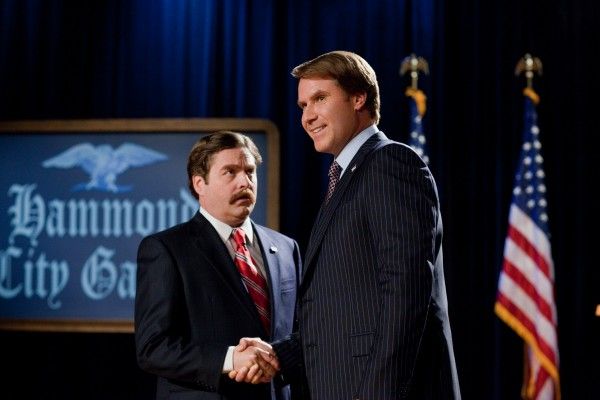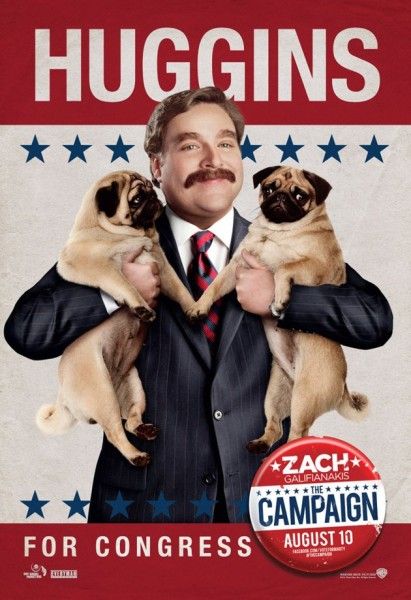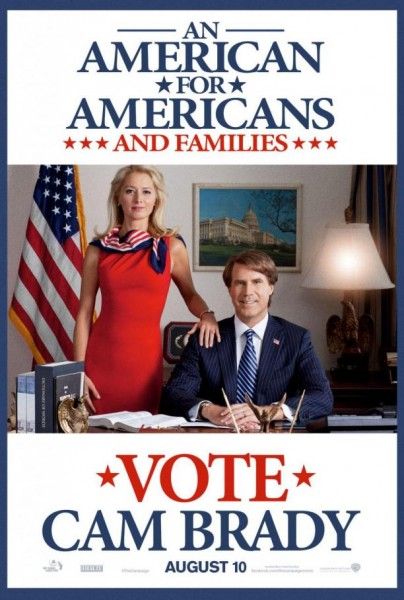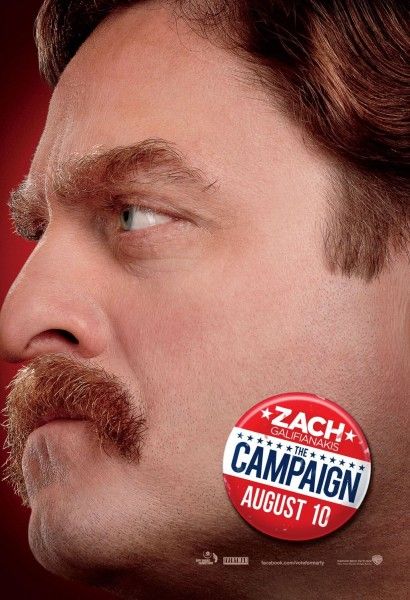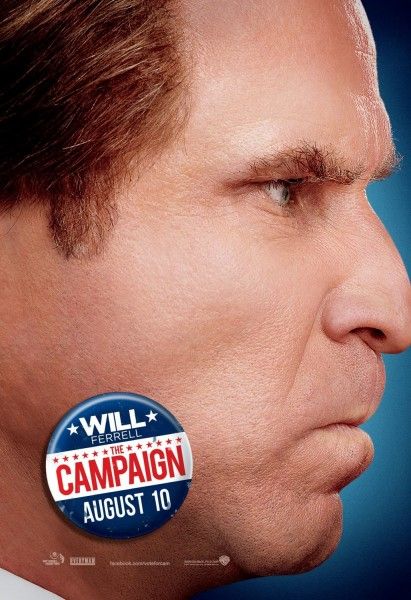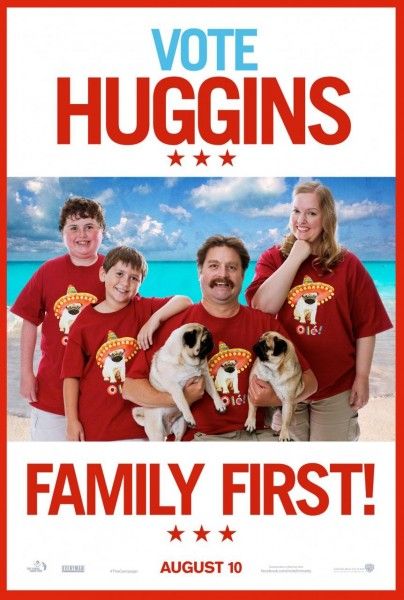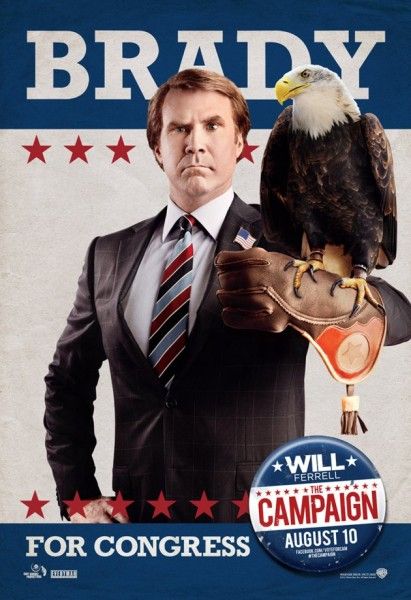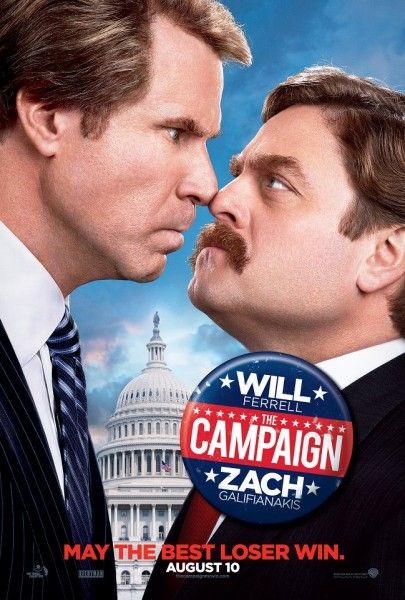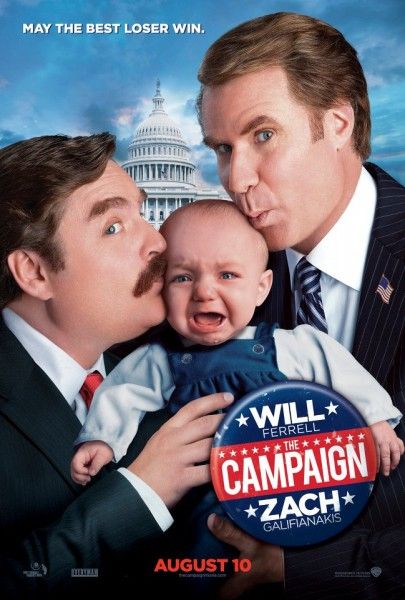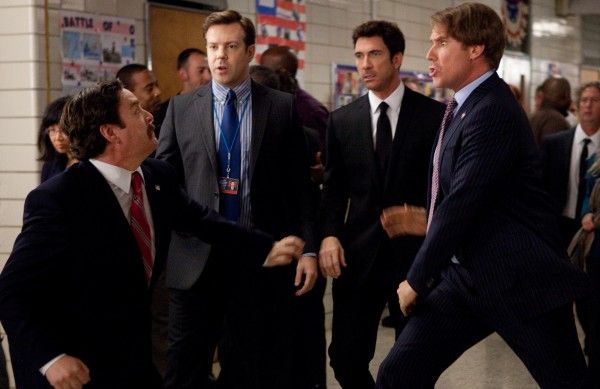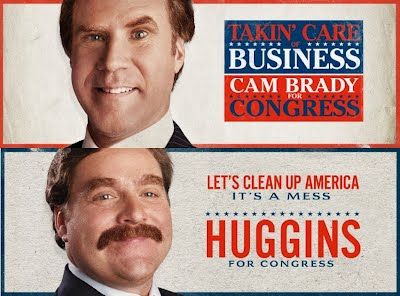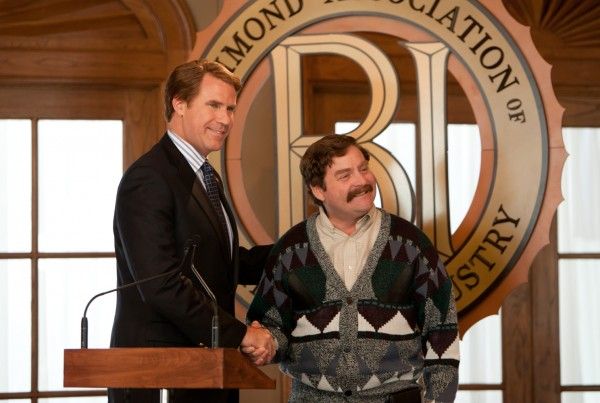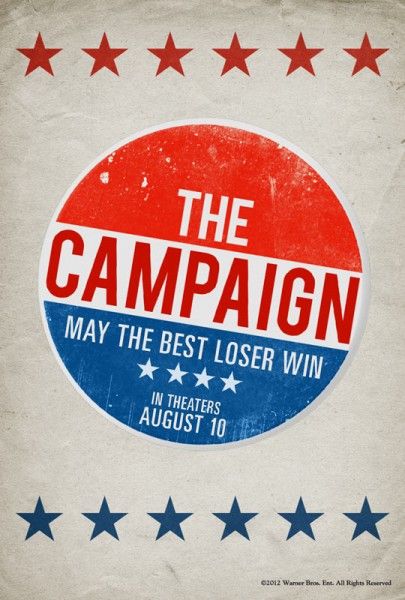Director Jay Roach has been gearing up for The Campaign for years now, even if it wasn’t a conscious decision: the Will Ferrell/Zach Galifianakis-starring politi-comedy (arriving August 10th) might—at first glance—seem like the sort of thing that any comedy director might be able to tackle, but look closer and you’ll see a film that needed the touch of someone familiar with the world of politics. After his last two films (Recount and Game Change), Roach was the perfect guy for the job.
Along with some other online press, I traveled to The Campaign set back in February. While there, we had a chance to speak with Roach about working with Galifianakis and Ferrell, where Roach’s career path almost took him, and to find out just how much of The Campaign is based in reality. Wanna know what he had to say for himself? Meet me after the jump.
On August 10th, American politicians on both side of the aisle are going to be ruthlessly mocked by Jay Roach’s The Campaign, the politi-comedy starring Will Ferrell and Zach Galifianakis. Just how ruthless will that skewering be? Back in February, some other online press and I traveled to New Orleans, where we sat down with Roach on the set of The Campaign to find out just how savage things were gonna get. Here are a few highlights before we get into the big (and I do mean big) answers:
-
On preparing for The Campaign with two political films for HBO, Roach says: “I actually did so much research on those things for Recount and Game Change that I felt pretty confident about how to deliver a grounded-ness to the political stuff so that when the characters go off, it’s against something that’s plausible. And that helped a lot. It really helped.”
- Roach is determined to keep things timely. Say, by adding Super PACs to The Campaign: “We have that exact thing happen, too, where a ton of money flows into one campaign and then a ton of money flows into the other and in both cases there’s a tremendous event that’s sponsored by the money, by the financier throws the campaign way into another scale and we use that throughout…the rise of the Super PACs are definitely touched on in our film as well.”
- What sort of thing keeps the director of Meet The Parents up at night? Not getting enough takes that are worth using in the film: “I only get to do (this) because someone said, you’re in charge. I don’t necessarily like it because it’s so stressful to say, no, that’s good enough. Let’s move on. That’s what keeps me up at night.”
- On the idea of shooting long days: “We shoot many, many hours and hours and hours to get one great minute. You know it’s like being a still photographer, like a professional still photographer who shoots fashion or products or whatever or portraits even. They might shoot three or four thousand images to get one shot; you know one great killer shot that goes on the cover of a magazine.”
- On working with Ferrell and Galifianakis: “They’ll try anything. They’re actually some of the most easygoing people I’ve ever worked with. But they’re also driven and, at the same time, they have a great balance of being driven and just cool and that’s been a very joyful experience for that reason.”
Without further ado, let’s get to the interview:
Question: Let’s just talk about some of the real life inspiration you’ve drawn from politics. I believe you mentioned the Obama/McCain debate. What are some of the other inspirations that you get right off of CNN?
JAY ROACH: Will’s hair came from Rick Perry, John Edwards. You know, those people have just the perfect hair. It seems like you can’t actually have really bad hair or be bald and run for President of the United States. So there’s a whole joke-- a running joke—about, “How’s my hair? Strong.” And the look of Will came, I think, from that. But then all of the—I think Marty’s character is inspired more by the out there candidates that keep running from—you know people come out of nowhere and just become suddenly significant. And he is not really like any of them because he’s so specific. He’s got a very specific take on the character. Have you guys seen the character yet? I wonder if you’ll see him talk— well, you will. You actually will. You might hear him with Sarah. How late are you guys staying today?
As late as we can?
ROACH: There’s two scenes we’re going to do at the end of the day with Zach and one with Sarah Baker, who’s amazing by the way. Sarah’s great, such a great improviser as you could hear. All that she was just doing was completely improvised. But Zach’s body language is— everything about him is very unique, not quite derived from any particular thing. But I think all of us are 100 percent coming from seeing politics— seeing how politics has become much more about the sort of win at all costs, take down your opponent and less and less about statesmanship. And that’s— I mean we’re not a very preachy movie, but we’re definitely going after those kinds of candidates or that kind of race that is all about smearing your opponent before he smears you and then, if he does smear you, smear him back as hard as you can. You know it’s that continual character assassination and so called oppositional, opposition research, you know, that gets— that’s where we got inspired to take on some real life.
Can you talk about where the movie’s set?
ROACH: It’s set in North Carolina, but it could be anywhere. It’s like in Anywheresville, North Carolina but it should feel like there are national stakes. It’s a Congressional election race. It’s not a Senate race so it’s not quite that high profile and it’s more like a non-metropolis district in a southern state somewhere that’s a little out of the way, a little suburban, and it’s like it has a small town feel. In the middle of it, it was almost like one of those towns that’s near a city that’s been swallowed up by the suburban sprawl. And so there’s still a downtown area, but a block away is a Walmart and a block in that direction is a FedEx plant. You know, it’s one of those, but in the heart of it is a small town feel. So it’s kind of bottled up and local, but it has national stakes. And the quote/unquote villains are national-stake guys who are trying to co-opt the community for their own purposes and use it as a place to bring their factory as I was telling you earlier. So that’s what the sort of national stakes are all about.
How crazy do things get in the movie? Is it more based on reality, or---?
ROACH: Well, it’s kind of fun because a lot of times in comedy you want the straight version of things to be as straight as they can so the X factor can be as absurd and out there as you need it to be and to actually be, “You know what, I think in this press conference this is what would happen. Here’s who would be standing there and here is how much security they would have. Here’s what kind of cameras would be at this level.” You know, I actually did so much research on those things for Recount and Game Change that I felt pretty confident about how to deliver a grounded-ness to the political stuff so that when the characters go off, it’s against something that’s plausible. And that helped a lot. It really helped. And I’ve gotten to know a lot of spin doctor-kinda guys, especially in Game Change, but in Recount as well. The political operatives and the political consultants are such a class of people and they have a very specific thing and every one of them is their own kind of samurai warrior self who is defined—you know each have their own— they’re like superheroes. They just travel around and get hired and do different campaigns and take on different—and each of them are very different from each other and somewhat inspired by real life, too, but generally composites.
As far as I know, there’s no character based directly on any one character. They’re all kind of inspired by a variety of people that you might recognize.
Yeah, I saw Tim Wattley(‘s character name) on IMDB...
ROACH: Yeah.
Isn’t that a Seinfeld reference?
ROACH: No. Not that I know of.
I think Bryan Cranston played him?
ROACH: Was his last name Wattley or was it actually Tim?
No, it was a character on the show.
ROACH: Oh, really, really. Wow!
Yeah.
ROACH: I don't know if that’s intentional. That might just be a mistake. I’m glad you told me. We might have to fix that. (Laughter)
Was it a conscious choice to make three political movies over the past several years?
ROACH: It’s somewhat conscious. You know, I was very interested in politics in college and was heading to be a lawyer. I have a degree in economics and I was interested in it. I hadn’t really gotten super serious about it and I’d done a lot of student politics in high school. But, you know, student senate stuff and I was the president of District Council in New Mexico for 19 schools. Like I was really into— I really think it would be interesting and fun and challenging to go into politics. But, by the time I was in school at Stanford, they made you take so many other courses and I started taking field photography and I was also writing for the paper. I worked for the radio station. And I just, somewhere along the line, it was partly that I had a darkroom in the basement of my dorm and I started processing black and white stills and that was kind of the end of pre-law. I would just stay up all night, you know, printing stills and I finished the degree but I didn’t apply to law school. I just waited a year and then applied to film school and I went to USC. But I always— I don't know. I always had a respect and an admiration for people who got into politics. I certainly have always been interested in law and political science and I’ve been an amateur student, you know just a dilettante really in connection to politics my whole life. I’ve always read a lot about it and always been interested in it. And I’m pretty opinionated sometimes although my political views change all the time, too. So I’m not very zealous. And then I had let Paula Weinstein know that I was looking for a political film to do and the opening came up for Recount and she called me and said they had been trying to do this.
And I had actually worked on a few pictures connected with politics before I did Recount. One was sort of a similar kind of a story to The Ides of March about a spin doctor who got involved with someone who turned out to be corrupt who helped launch him and he had to undo— you know it was like a whole spin doctor. So I guess I’ve been interested in propaganda and spin and political PR for a long time. Yeah. I’ve talked about it before that I, years ago, worked on a film about the psychology of evil using Adolf Hitler as the vehicle for it and it was called The Empty Mirror and I did it with my film school partner, co-wrote it with him and then produced and also shot a lot of second unit on it. And I did a tremendous amount of research for a year; actually a number of years. We worked on it for three or four years in the research and studying Goebbels and Wiesenthal and became a little bit of an obsession about how such a dark idea could become a contagious idea.
And it was way too serious for what we’re talking about but I really did start to connect with the notion that ideas can be incredibly good. I mean you can make an idea spread for good but you can also make an idea spread for bad and the power to make an idea spread, memetics, you know which now people talk about memes. But, when I first came across the study of memetics and memes way back, I was like, oh my god! There’s people who actually have a whole science devoted to what makes a sticky meme and that idea of that question of why some ideas about how civilizations work catch on and others don’t. So it’s such an over simplistic, superficial way to talk about it but that’s what really I’m fascinated with is how ideas become and how you can change the world through making ideas stick. The whole thing of simplifying repeats or the big lie and all these things that it just seems almost people take for granted now.
I remember thinking, what? people would distort reality and make that, you know, a truth that would spread in some way?, a truthy kind of truth that just— and I’m very naïve about those things but the power of these spin doctors or any kind of salesmen or, you know, a storyteller; the power of stories to [unintelligible] make an idea contagious somehow has always fascinated me. And obviously I went away from the political side and got into filmmaking for some related reason because we do the same thing. It’s just not connected to how civilization should run.
So I guess this is the longest answer ever. But it’s just to be able to blend entertainment, storytelling with also some of the, for me, the deeper questions about how then shall they live. That’s what has led me to these kinds of films. And I want to do more of them. For sure I’m interested in this arena, be it comedy or drama or whatever. Try to fit that in your…just put the whole quote in. (Laughter)
When you’re making a comedy and just keeping a baseline in reality, what do you do when the baseline becomes increasingly absurd?
ROACH: Yeah. When real is crazier than fiction, yeah. It’s a really good question. We’ve actually worried a little bit about it because, when we started, it was before the GOP primary stuff had kicked in and, wow, every day we would—and we’ve tried to use some of the things that have been going on to kind of…like one of my favorite things that we see in politics all the time is how to make a bad thing sound good or a good thing sound bad. And the way, for example, Herman Cain, when it was revealed that he had all his affairs and that somehow it got out. That just makes him more human and his poll numbers went up. And there is a fair amount of that now in our film that, when people, when things go wrong and you think, “Oh, that’s bad; no, that’s good.” Like, that’s the way that politics is now: everything is turned upside down and the power of the political operatives to make a bad thing sound good and good things sound bad is always hilarious.
You know the same thing with the other- there are a number of turns in our film where just when you think that’s it, the candidate can’t possibly survive that, they turn it into the upside of their campaign and that whole idea we ran with and that was largely inspired by the GOP primaries this year because there was so much effort to say, well, Rick Perry, you know, got a C minus or whatever and that just shows he’s one of us. (Laughter)
You know, like what? And that kind of— I mean it’s not just Republican. It just happens to be the Republican thing. If we were in the middle of a Democratic primary right now, that would then tend to be the same, exactly the same. And so we did borrow some things from the Democrats, too. I would say the John Edwards hair. Wasn’t Spitzer a Democrat?
Yeah.
ROACH: Yeah. I had Will Ferrell wear black socks today when he was there.(Laughter)
ROACH: And you know the black socks story. So it’s fair game. I mean it’s a bipartisan…
Mockery of politics.
ROACH: Mockery. Yeah. Bipartisan mockery. That’s my future. So yeah, it is hard to top the real thing. I mean it’s so reality show now, so professional wrestling. You know it won’t be long before people are just wearing masks and capes and running for office. (Laughter)
What are some of the other things that come to mind that you’ve seen on the news in the last few months that have caused an effect on you?
ROACH: Yeah. Let me think. I’ll think of some more answers. So most of the big moves, like I said, have been— oh, I’ll tell you one. Just the way Super PACs are working, how huge money can be thrown into a campaign and suddenly the spots get dramatically more high production value, dramatically more widespread.
Right.
ROACH: We have that exact thing happen, too, where a ton of money flows into one campaign and then a ton of money flows into the other and, in both cases, there’s a tremendous event that’s sponsored by the money, by the financier throws the campaign way into another scale and we use that throughout. So the rise of the Super PACs are definitely touched on in our film as well.
Is there an element of new media as well? I know we saw the iPhones in the shoot or using Twitter and— is there that sense in the film?
ROACH: Well, yeah; a little bit. I mean that thing we were shooting today, the idea that he thinks he’s going to put it on network T.V. and his campaign manager says, you can’t put that on T.V. What are you crazy? So he said, well, put it on the internet. So the idea that you can use a negative commercial to spin something, even if you can’t access to mainstream media, you can easily get it on internet through a viral effect. And I’m trying to think if we’ve actually shown the viral video thing kicking in. We’re not really Twittering much or Facebooking. We probably should think about that. We’ve talked about how to measure their score. You know I’m obsessed with checking approval ratings online in real life. Like I’ll say, well, how did that go over? And I’ll, you know, go online. And definitely we’re using graphics to show that but we almost should invent a website or that they check all the time that’s equivalent to checking your Facebook friends or something but it’s a polling site. That’s actually a really a good question. We should work harder on that because we’ll probably just be seen as being too old fashioned unless we do. But they do use the internet to launch their quote/unquote viral negative campaign ad.
When you’re working with actors that improvise this much and seem to like doing multiple takes, how do you know when to move on?
ROACH: That’s a good question and it takes a little bit of mixture of inviting chaos and inviting ideas all the time because invariably you start with one thing and it gets so much better by the energy to top what you have that’s always there. We try to keep that always— like surely we can beat this. What’s the better—this is one way; what’s the better way? And that question is in the air constantly. It’s actually neurosis-producing because you never really feel like you’ve got far enough. You never do. I never do. And most people in comedy I feel have the same anxiety about it because, unlike in the dramas they’re performing, get what the story should be and there’s a certain click and you go, okay, that’s too full. That’s suspenseful. That moves the story. You know you’ll get something else. Like that’s literally the rise and fall of a joke. The mortality rate is so high. It’s like the GOP candidates. (Laughter)
When it comes in, it’s the greatest joke ever and, if it’s not really the greatest joke ever, it will be dead just in the circle of tastemakers that we have around us, you know, very quickly. And sometimes perfecting the one thing can be the enemy of getting any traction on anything else. I mean it’s really tough. You have to will yourself to let it go and say, okay, I think it’s good enough. Let’s go onto the next thing. And then to convince everybody else that you really have it is also one of the hardest parts of directing. I’ve heard it. I’ve read it. Others directors say this but that moment from cut, print, we’ve got it, really convincing people that you really do and getting onto the next thing, convincing yourself, is the hardest thing by far. Everything else anybody can do. And I only get to do it because someone said, you’re in charge. I don’t necessarily like it because it’s so stressful to say, no, that’s good enough. Let’s move on. That’s what keeps me up at night. It’s, did I move on too fast? Should I have stayed and shot more? Did I shoot that one too much and not put enough in the other ones that were that day? I mean that’s really, in comedy, it just kills you but that’s really, really, really stressful.
And I imagine there’s times in editing, too, post-production where you kick yourself, right?
ROACH: Well, I will say that that’s fortunately not so common because I do drive for volume. You know I like to shoot a lot of choices. I like a lot of stuff— and so I push to go faster, to shrink the time between the takes so that the takes are what you’re spending all your time on.
And I do get— I cover it a lot so that I have a lot of freedom because I do find that a lot of them don’t come together in post and, if you haven’t given yourself enough choices, you don’t get elasticity. You don’t get flexibility in how it goes together. I wish I was sort of someone like Woody Allen who can stage everything in one long master shot, no coverage; just, you know, that’s it. You don’t have to shoot a lot of extra stuff because, in that five minutes we just shot, that’s the five minutes and that scene is going to be in the film. I don’t know how to do that. (Laughs). I wish I did, but I don’t. So I shoot. We shoot a lot. We over shoot. I mean we cover multiple cameras. We shoot many, many hours and hours and hours to get one great minute.
You know it’s like being a still photographer, like a professional still photographer who shoots fashion or products or whatever or portraits even. They might shoot three or four thousand images to get one shot; you know one great killer shot that goes on the cover of a magazine.
And I really, unfortunately in comedy, it is a little bit about that. You just have to recognize the mortality rate for jokes and that the moment is so high and all of them may die by the time you get to the cutting room. So you better have a lot to back yourself up. If you knew exactly what was funny and exactly how long it should take, exactly what the elements should be, you could work a lot less hard. You could go home a lot earlier. But I don’t know that. I don’t know how to do that. I wish I did.
And how much of the dialogue actually just kind of goes up when you cast two guys like Will and Zack?
ROACH: I mean, you know, they are involved in the scripting process. Almost everyone involved in our process was in on that many months; eight or ten months of writing: Zack, Will, Adam, Chris, Shawn Harwell. And then we got notes from everybody else, too; the studio. So a lot of what’s in the script is stuff they came up with, too. But it is true that they’ll, again, keep topping what they have. They’ll show up that day and say, this is okay, but…like last night we finished shooting the main part of the scene we just got into today and I really thought we might have it but we all said, really? Is that the end? You know it’s that same feeling. Do we have it? I don't know. So we stayed late last night and riffed on some of the ideas that we shot this morning and these are additional things. And we have a whole other script that’s got a slew of additional alt lines that have already come up before we got here. So you have the main script, the alt script with backup things if those don’t work. And then probably double that of new things that come up that day. So you have to say, okay, how much time— like right now I’ve got to go back and make sure I don’t over shoot the alts to protect that idea, to make sure I have time to shoot Zach rubbing Sarah’s feet so this other montage that’s supposed to be an intimate moment and Zach being a giant haired mega church preacher (laughter) plugged into one of those kind of, you know, thirty-thousand member church shot. We’ve got some stock footage of a giant place. And he, as part of playing at who’s the most religious, he tries to out-religious Will and they have a bit of a thing. So I’ve got to make sure I have the time. You know, anyway I’m making it sound like it’s the hardest job in the world. It’s really a fun job and it’s a blast and I’ve no business complaining. I’m just letting you in on how like, okay, those are stressful choices but it’s a blast. Working at this level of talent who do come in every day with way better ideas sometimes than what you had thought, it’s great. It’s so great. And these are just so easygoing and such good sports. They’ll try anything. They’re actually some of the most easygoing people I’ve ever worked with. But they’re also driven and, at the same time, they have a great balance of being driven and just cool and that’s been a very joyful experience for that reason. And it’s also cool to work on something where you do think there’s something relevant about it. It’s a comedy but it is trying to tap into some of the stuff that’s really happening and we’re always inspired by John Stewart and Colbert and Saturday Night Live and anybody who’s willing to try to use comedy for the force of good. (Laughter)
I don’t suppose there’s any chance that Stewart or Colbert, then, is there?
ROACH: No. Well, you know, I don't know. I don’t think so. No. I don’t really— we didn’t have a thought from them. They’ve been in so many of our friends’ movies. Colbert especially has made a lot of great cameos. Yeah. We have some ideas but we don’t know yet exactly. Like I say, a real man…James Carville is right up the street.
Yeah.
ROACH: It’s so funny. I just met him. He’s one of my all time heroes, that guy. Speaking of, you know, making a good idea bad or a bad idea good, that guy is fantastic. (Laughter)
No, I really am fascinated by Carville and I see him jogging all the time by the park where I live. Yeah. It’s great. We thought about that but we have a whole list of places where they go, but we just don’t know who it is yet. So it’s probably just cutting the film and seeing what works.
I just was wondering if you could give a few words about the cast because it’s just an amazing cast; like from Lithgow and Dan Aykroyd.
JAY ROACH: I know. Dan Aykroyd? Oh my god! I couldn’t believe that Dan Aykroyd—no, it’s great. You know people are drawn. I do find these kinds of scripts that people feel are about something and are also funny. I mean McKay and Henchy are really funny writers and Will, too, wrote a lot of it. And, when people hear those guys are getting together and doing something political, I just feel like there’s a beacon that goes off and people come running and want to participate. I really think that people recognize what they’re up to and the kinds of stuff they do and want to be a part of it. Once you have a few, they all want to work with each other. So, you know, I’ve been really lucky. I just think it’s so funny and Dylan McDermott is such an odd chemistry into it, which is exactly what we wanted. He’s just kind of this dark Rasputiny, Timothy Leary, like an assassin who just happens to be a political consultant and he’s great in the film, too. So, yeah. We got lucky, you know. But, more than all luck, I mean there’s a lot of hard work to get to it.
And that, folks, was our time with Jay Roach. That man gives some long answers, eh? I was impressed with Roach’s technical knowledge, and really intrigued to learn that the dude who’d directed the Austin Powers films had come “this close” to being a lawyer. Watching him direct the scenes he mentioned in the interview (particularly the “foot massage” shot featuring Sarah Baker and Zach Galifianakis) was hysterical, and not something I’ll soon forget.
Speaking of which, we’ve got more Campaign-related content headed your way, folks! All of that’s going to be dropping today, in anticipation of The Campaign’s August 10th debut. Special thanks to Jay Roach, the people at Warner Bros., and the great city of New Orleans for facilitating this visit. While you’re waiting on our next bit of coverage, feel free to sound off in the comments section below with your thoughts on Roach, Zach Galifianakis, Will Ferrell, and The Campaign!
Here's more from The Campaign Set Visit:
- 20 Things to Know from The Campaign Set Visit
- Will Ferrell Talks Reshooting Scenes to Make His Hair Look Good, Bonding with Zach Galifianakis Over Their Southern Roots and More on the Set of The Campaign
- Zach Galifianakis Talks Working with Will Ferrell, His "Non-Sexual" Character, and Disliking Children on the Set of The Campaign

